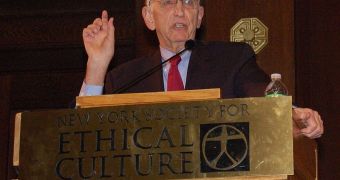It’s true that people have long since suspected that governments delve in the kind of surveillance activities that the NSA files have so far revealed, but the important part of the Snowden case is that the whistleblower brought out palpable evidence – the documents.
In an interview for Cairo Review, Daniel Ellsberg, the Pentagon papers whistleblower shows his support for the former NSA contractor.
“People have always sort of assumed that we were being listened to. But the difference between assuming it and knowing it is quite significant. It’s very inconvenient to act as if you are being listened to at all times, to encrypt everything, to use spy trade to try to protect your sources and so forth. It’s a lot of trouble,” Ellsberg told the publication.
Furthermore, he points out that the files also prove that US leaders have lied countless times over the years, starting with James Clapper’s statement in front of the US Congress, saying that the intelligence agencies do not collect data on US citizens and going back to former president George W. Bush who said that the communications of Americans are not being listened to without a warrant, as per the Fourth Amendment.
Of course, both claims have been proven to be false over the past several months as more and more files have been published by various news organizations across the globe.
“In the case of Snowden now, the documents are just there. They can’t deny it. In the case of the Pentagon Papers, you had four thousand pages that I gave to the newspaper, plus several thousand that I gave only to the Senate,” Ellsberg remembers.
The good thing, the whistleblower says, is that the Snowden files have had a big impact on the US Congress, making people talk and causing plenty of reactions from politicians, which gives the hope that in the end things will change.

 14 DAY TRIAL //
14 DAY TRIAL //